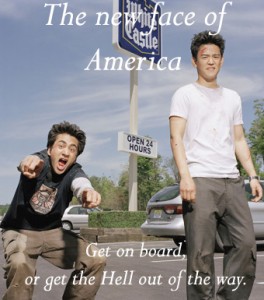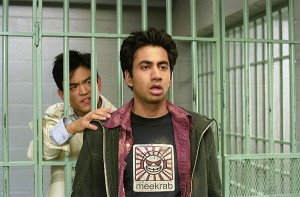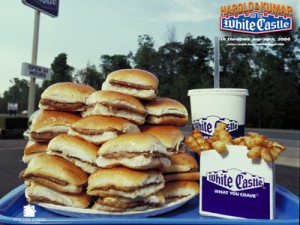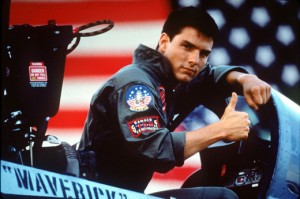This time around, I don’t think I’ll be able to give our next candidate quite the respect and time it deserves.
It is the most important film about race in America made yet in this young century.
And perhaps I will return to it in the future in even more depth, because it certainly deserves it.
Of course, I’m taking about Harold and Kumar Go to White Castle.
Consider this the Cliff’s Notes – my short, simple attempt at tackling this cultural touchstone. And of course you choose to use the Cliff’s Notes, because you fail to understand how the competitive landscape of being young in America actually works.
Or perhaps because you know it all too well.
Learn more about that greatest story of the 2000s, the rise of Asia and the Asian-American, and what this remarkable little comedy has to say about it, after the jump —
Harold and Kumar was given birth by the the sort of stories that parents tell to SAT-age children to scare them into staying up nights studying, or the kind of stuff that keeps you in New York Times columns and bestselling books for the better half of your middle-aged years.
Personally, I think the meta-story here, the trend that made Harold and Kumar as inevitable as any work of its kind might be (in my opinion, not very, but that’s a separate matter) is one of the great human stories of our era, something we should be proud to witness, and perhaps America’s last, best hope for holding onto its soul at the tail end of this new gilded age.
Yes, I’m talking about the rise of Asia — specifically about the rise of Asian-Americans, specifically the rise of young, educated, gutsy Asian guys who are probably living the American dream a Hell of a lot better these days than you are, unless you are a young, educated, gutsy Asian guy.
And you know what? That’s not their fault, it’s entirely yours. Thankfully, it’s not a zero-sum game.
You know one thing this movie isn’t? “Just another stoner movie.” That criticism always reeks of nonsense (see the recent brilliant multi-genre tour de force “seriously, it’s really good and you need to see it right now,” movie, Pineapple Express).
Look, I’m not here telling you Harold and Kumar is the best movie ever, or even the best movie of 2004. It clearly isn’t. You don’t need me to tell you that.
But it is the most culturally important – both in terms of the feat it accomplished in building the vocabulary and semantics around its key subject matter, and in terms of fleshing out the epic landscape of American literature with a fitting foundational narrative for some of its latest, greatest arrivals.
And “cracking” the movie is as simple as realizing that the biggest, most obvious symbol in the movie isn’t just there by accident.
It’s not a coincidence that Harold and Kumar “go to White Castle.”
(Or, for that matter, that they “escape from Guantanamo Bay,” but that’s another movie)
Harold and Kumar Go to White Castle is about young, educated Asian guys taking the things in society that are usually reserved for young, educated white people — things they do and should have every right to under the unofficial American credo of equal opportunity, but which social convention and their own self-imaginings have not resolved yet to give them — things high and low, admirable and less so, awesome and less awesome, but desirable things — things like the freedom to choose your profession, the professional cache to force other people to do your work, pot, random hook-ups, hanging out with the coolest people, road trips, crazy parties, etc. It’s about them busting through restrictions placed on them by their ethnicity and taking their share of the American Dream.
It’s both about how Asian-Americans have arrived as full blown American adults and can take all these things now that their parents didn’t want them to have and society thought they weren’t up for —
But it’s simultaneously making fun of these things and showing that the ideal to which most white people aspire is pretty silly, and often downright empty. And it’s in this sidelong disinterest in the rewards of prosperity that Harold and Kumar really merge with American culture and force American culture to merge with them.
Sure, now they are big time and they get to just run into and hang out with TV stars, which previously Asian guys wouldn’t be allowed to do, but the TV star turns out to be Neil Patrick Harris, and he’s a crazy cokehead who steals your car.
“The word ‘ivory’ rang in the air, was whispered, was sighed. You would think they were praying to it. A taint of imbecile rapacity blew through it all, like a whiff from some corpse.”
-Joseph Conrad, Heart of Darkness
Sure, now they see themselves as big shots who know how to party better than the more traditional, passive Princeton Asians, but it turns out those people have the craziest parties. It turns out that being the cool guy isn’t all it’s cracked up to be.
“White Castle” as a restaurant is ironic in itself, because it conjures associations with the fanciest, wealthiest, most prestigious, impressive sort of place, but they are immediately trashed — it’s really the cruddiest of the burger joints with the smallest, lousiest burgers, and to get there they have to drive all over the place on the New Jersey Turnpike (I would like to note that the biggest factual error in the movie is that everyone from NJ knows there is a White Castle much closer to Harold and Kumar’s place than the one they drive to, but, hey, suspension of disbelief).
It’s simultaneously a comedy of people breaking out of their social role (Like, say, Trading Places), and a comedy that takes place in a world-turned-upside-down (Like, say, Dr. Strangelove or, more recently, Step Brothers).
Still, it’s important to remember it isn’t a movie about everybody being awesome. And it’s not so much about making society the way we want to make it as making fun of how society is. It’s not quite epic, it’s mock-epic.
Sometimes, the line between epic and mock-epic is not at all clear.
And I think that’s what makes it relevant where so many other explorations of the Asian-American soul fail to gain mainstream traction. Because we’re not a nation-building civilization right now. People are trying to erect new cultural edifices, and they are having trouble keeping them standing, because our society seems very fluid. We are overrun by our own institutions and caught up in our own complexity. In these kinds of environments, mock-epics tend to thrive and give us a better idea of what’s going on than conventional ones.
Agree? Disagree? What’s your take on the rise of the Asian-American? Are you yourself Asian-American? If so, what do you think of this movie? Sound off in the comments!




Pete, thanks for writing this. Being an actual Asian-American man myself, I have a lot to say on this subject, so I’ll do this over a series of comments.
First, I’m sure many OTI readers are aware of this, but movies like this, for better or for worse, do support the “model minority” stereotype. Though Harold and Kumar struggle with racial bias, they are both well educated, priveledged products of the American Dream. Harold doesn’t work in a dry cleaning shop; Kumar’s dad is a doctor and not a taxi driver. I can’t remember if this movie dealt directly with the whole “model minority” issue, but I wanted to point out a couple of quick reasons why this sort of stereotype is dangerous:
1) calling one racial group a “model minority” is a coded racial criticism of other groups that aren’t often referred to as “model minorities” (blacks, hispanics, native americans)
2) calling Asian-Americans “model minorities” (and to a lesser extent, depictions in pop culture that present them as successful products of assimilation and the American Dream) glosses over tremendous variances between sub-groups of Asian-Americans; e.g., Cambodian recent immigrants do not perform as well in school as American-born Korean American kids. Even Korean-Americans, often seen as shining examples of immigrant prosperity, have one of the lowest health insurance rates among ethnic groups in the nation.
Again, I could go on an on about this, but I wanted to be sure to bring this up, since no overthought discussion of this movie is complete without the model minority conundrum.
It’s a very good point, and I could write a whole other post about it (and probably will at some point). I think the movie is very conscious of this and works very hard to attack this stereotype.
1. Harold and Kumar are very unhappy with the social roles apportioned to reject them pretty strongly. The movie is about them rebelling against the expectations that are set for them, and finding yet another set of expectations that are just as rejectable, and then eating hamburgers. I think they find a happy medium that considers the model minority stereotype with appropriate depth.
2. They make fun of the “model minority” stereotype by giving Kumar super-doctor powers while high. I think it’s over-the-top enough that it has to be a mocking parody, but I guess it’s a judgement call.
3. Although I cannot be certain because I have not seen it, a quick perusal of the imdb page confirms the hunch that this very topic is the primary subject of _Harold & Kumar, Escape from Guantanamo Bay_.
So, by all means, bring it up, but I think H&K are on the right side of this one most of the time.
The other thing I wanted to mention was that I can’t believe I didn’t realize the significance of “White Castle” as the “whitest castle of them all” until you pointed it out.
As for point 2, as we’ve seen time and time again, many people are unable to recognize things that are over the top to the point of mocking parody. For example, “Simple Jack” and the whole “full retard” thing from “Tropic Thunder.” Advocacy groups for the mentally handicapped (is that the PC term these days? “Special needs”?) found those jokes to be unspeakably offensive, though the filmmakers were clearly using that as a vehicle for satire. Or were they? More on “Tropic Thunder” later on this blog…
Anyway, so the filmmakers may intended that surgery scene to be mocking parody, but the point was probably missed by most people in the audience. For review:
http://www.youtube.com/watch?v=-gApgseUuXc
Lee: It’s “mentally disabled.” The appropriate lingo for disability is a fluid thing and changes constantly. In a while, the proper term will be different, and it’s difficult to keep up with sometimes, so don’t feel bad about that at all.
As for “Tropic Thunder” itself, I wasn’t offended, and believe me, I could have had the “right” to be- I have disabled siblings and work in special education. But I wasn’t, and for two reasons. First, I thought it was done well enough on its own that it wasn’t offensive. Secondly, that movie made fun of pretty much everybody. Gays, Jews, Hollywood itself, Asians, blacks, rich people, fat people, British people… I mean, I think the only groups not at least poked at a bit were Native Americans (we get ignored even by movies that have no qualms) and Mexicans (I guess they just couldn’t work in a joke about illegal immigrants or something). Nothing was sacred. Realizing that pretty quick, I didn’t take offense to any of it.
I have a lot of issues with some groups in the disabled community, and ones like that do to disability what similar groups do for other minorities: they cause more divides and make things move backward instead of forward.
Anyhoo, what about the fact that Neil Patrick Harris originally became famous for playing a brilliant white doctor? I think his debauchery in the movie is meant to stand in contrast to Kumar’s abilities. Kumar is “real” and a brilliant doctor like Harris’s former character. But Harris himself is clearly not remotely capable of being a doctor. Perhaps to say that “white men can’t [really] jump,” so to speak?
As a non-Asian, non-American, I’m mostly interested in the epic/non-epic divide raised at the end of the article – if one should call it an article.
This is, of course, especially the case since Top Gun was mentioned as an example of blurring the line between those two, and in my view not without justification.
Since more movies since then – and before, I suppose – have been tip-toeing on and crossing the line of epic and mock-epic, and thus have more or less unintentionally created infinitely more interesting films than the ones just about succeeding, would this be worthy of any further OTI attention when I request it?
For the record: I hereby do. I mainly do this because I simply love Top Gun in spite of being a complete movie snob in all other respects, and as of yet I can’t figure out why exactly. Any help would therefore be appreciated.
Thanks,
Dereck
You want some quality overthinking of Top Gun?
Will do.
It might take me a bit (I’ll have to make sure to track down the movie and watch it again, so I don’t confuse what’s actually in it with the cultural echoes of it), but Top Gun will definitely get overthought soon.
Just a small note; I’ve been wandering around on this blog since seeing a link to the strong female characters article (which I’ve made almost everyone I know read), and as of finding this one, y’all are my new favorite place. So, uh, thanks. Next time I comment I’ll contribute something meaningful to the dialogue other than “Oh my God! Someone else noticed this and wouldn’t make fun of me for considering this a huge landmark!”
fenzel:
I can’t wait. Seriously. Thanks a bunch!